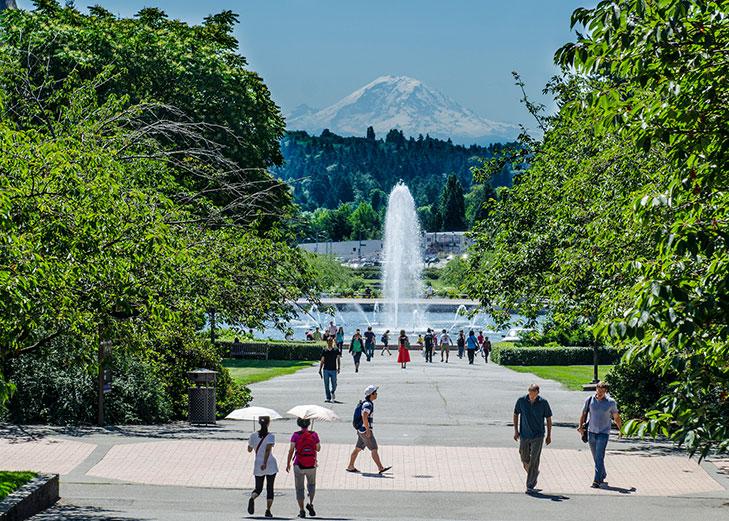
Here’s a roundup of programming, projects, and events that will be taking place at the Simpson Center this summer, including three summer institutes, two groups of summer fellows (one in the digital humanities, the other in public scholarship), and a flightless conference.
June 24-August 23: Summer Institute in the Arts & Humanities
Created by the Undergraduate Research Program and the Simpson Center, the Summer Institute in the Arts & Humanities (SIAH) provides intensive research opportunities for undergraduate students who will work with a teaching team of five led by UW Associate Professor Phillip Thurtle (CHID). This year’s theme, “Creating Alternate Worlds,” will draw on world building practices in design, literature, gaming, art, afrofuturism, philosophy, and science to encourage students to envision and materialize different worlds. Students will participate in lectures, seminars, small group critique, workshops, and tutorial sessions. They will read and discuss theoretical readings and learn techniques in world building from design, art, literature, and sciences. Students will then use these techniques to create worlds that reflect their ethical, intellectual, and creative commitments. On August 23, the institute will culminate with a day-long symposium and a “Worlds in Progress” exhibition where students will present their worlds as a form of research and creative practice. The symposium and exhibition are free and open to the public.
June 25-30: MLA Summer Teaching Institute
This summer, the Simpson Center will be one of only two sites to pilot the Modern Language Association’s new Mellon Foundation-funded summer teaching institutes, meant to strengthen the teaching of English at access-oriented institutions (AOIs), including community colleges and other colleges that prioritize access over selectivity in admissions. In January, the MLA announced that it had been awarded a grant of one million dollars by The Andrew W. Mellon Foundation to organize nine regional summer institutes between 2019 and 2021 for those who teach at AOIs and those who would like to make their teaching careers at them. Over the next three years, the grant will allow 144 doctoral students and instructors at AOIs to participate in weeklong summer institutes in different regions of the United States, conduct pedagogical research projects the following semester, and present their work at an MLA Annual Convention. For this year’s pilot program, the Simpson Center will host sixteen community college faculty and doctoral students from institutions throughout the Pacific Northwest, including four UW graduate students, as well as UW alumni now working at AOIs throughout the region.
July 13-20: Summer Institute on Global Indigeneities
Last month, we wrote about how the Summer Institute on Global Indigeneities (SIGI) has played a vital role in the development of American Indian and Indigenous graduate studies at the UW. For one week, the institute hosts a cohort of twelve graduate students and four faculty members from an international consortium of universities for intensive doctoral training in the field of American Indian and Indigenous Studies. On Friday, July 19, the week-long institute will culminate in a public research symposium in which all graduate fellows produce a ten-minute presentation on their dissertation projects from 9 am to 3 pm in the Peterson Room of Allen Library. The event is free and open to the public.
Mellon Summer Fellows in Public Scholarship
Each summer, the Simpson Center awards seven humanities faculty and graduate students Mellon Summer Fellowships, as part of our four-year Mellon-funded program Reimagining the Humanities PhD and Reaching New Publics. While faculty focus on developing course work that asks students to learn methods and approaches in public scholarship, graduate students work on research projects that collaborate with or otherwise meaningfully engage public audiences. Fellows meet weekly throughout the summer to discuss their projects.
Digital Humanities Summer Fellows
Digital Humanities Summer Fellowships support scholars pursuing research projects that use digital technologies in innovative and intensive ways and/or explore the historical, social, aesthetic, and cross-cultural implications of digital cultures. Each year, four faculty and four graduate student research fellowships are awarded. Fellows meet weekly throughout the summer to discuss their digital projects in progress.
September 18-21: Ecology and Religion in 19th Century Studies Conference
The University of Washington will be one of four sites to host this flightless, multi-site conference, which invites interdisciplinary attention to confluences between environmental and religious perspectives and practices in the long Anglophone nineteenth century (1780-1900). Since that century, anthropogenic climate change has rapidly accelerated. In Inside Higher Ed’s “Reducing the Carbon Footprint of Academic Travel,” UW Associate Professor of English Jesse Oak Taylor (a conference coordinator) and eleven other scholars write that air travel to academic conferences account for a significant portion of any universities’ carbon footprint. In response, conference participants will avoid air travel by digitally connecting conference sites at the UW, Baylor University in Texas, Georgetown University in DC, and Lancaster University in the UK. In addition, this method of networking, by lowering barriers of cost and transportation, promises to enable a more diverse and inclusive range of participation than is often possible at international conferences.